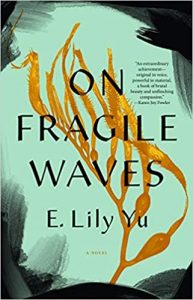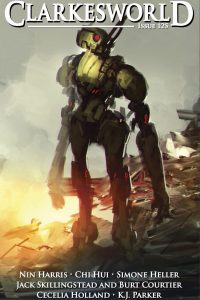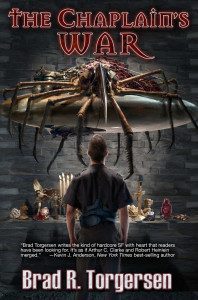Gary K. Wolfe Reviews On Fragile Waves by E. Lily Yu
 On Fragile Waves, E. Lily Yu (Erewhon 978-1-64566-009-5, $25.95, 288pp, hc) February 2021.
On Fragile Waves, E. Lily Yu (Erewhon 978-1-64566-009-5, $25.95, 288pp, hc) February 2021.
Although it only marginally features any fantastic elements (mainly a rather ingratiating spirit), E. Lily Yu’s luminous first novel On Fragile Waves has a lot to say about both the power of story and the limits of what stories can do. We first meet Firuzeh, the central point-of-view character, as a ten-year-old trying to escape with her family from a war-ravaged Afghanistan in which her earliest memories – rendered in a kind of impressionistic child-cenetered prose-poetry that oddly reminded me of the opening of Joyce’s A Portrait of the Artist as a Young Man – are punctuated by the sounds of fiery explosions. As they make their way through Afghanistan, Pakistan, and Indonesia toward what they view as the promised land of Australia, Firuzeh’s mother Abay tries to keep her and her brother Nour entertained with stories of classic Persian heroes like Rostam and his powerful horse Rakhsh. Almost equally fanciful, although Abay doesn’t know it yet, are her visions of a stress-free life in Australia, “a safe country…no bombs. No checkpoints. No soldiers or Taliban.” The contrast between these kinds of stories is the contrast between memory and hope, between old heroic models of behavior and dreams of a more manageable future. I was tempted to add between fantasy (dreams from the past) and science fiction (dreams of the future), but there’s really nothing to be gained by reading the novel in any sort of genre terms, unless you view the refugee survival tale as a genre unto itself, with roots as old as classical antiquity and as current as Britain’s “Refugee Tales” project. For some years now, refugee literature has even been a course offering in various university English and humanities departments, a sure sign that a literature has not only arrived, but may already be on its way to ossification.
So the obvious question is what an American author like Yu, despite her meticulous research in Australia and Afghanistan, might have to add to a genre which, like Holocaust tales, often seems to favor testimony over fiction? And the answer is, that’s the wrong question. On Fragile Waves is a gorgeously written, heartbreaking account of a family’s hopes and terrors, but it’s a literary novel, not an effort to replicate documentary realism, and it’s the major achievement so far of Yu’s restless fascination with literary voices and forms, evident in her short fiction over the last decade or so. Some of her more or less modernist techniques include bits of poetry and even sound effects as Firuzeh recalls her earlier childhood, a brief movie script she works out in her head, and dialogue without quotation marks – except when the point of view occasionally shifts away from the Afghans to external characters like a working-class Queenslander, a teacher, or a visiting American writer who sounds a bit like Yu herself. (Folks who insist on quotation marks might be reminded that this technique dates back more than a century.) In terms of such details, it’s a meticulously fashioned novel and, despite the occasional fragmentation of the narrative, the final effect is nearly seamless.
But to describe On Fragile Waves in such purely literary terms is a disservice to its deeply humane, suspenseful, and harrowing story. Firuzeh is observant and precocious, but her banter with her younger brother is lively and often funny, and her newfound friendship with another young girl refugee, Nasima, is both convincingly snarky and ultimately heartbreaking (it’s also the novel’s most direct nod toward fantasy). As the family’s utopian adventure turns increasingly dystopian – a promised passenger ship turns into a crowded boat nearly swamped by a typhoon, the long-anticipated landfall turns out not to be Australia but a seedy detention camp on Nauru, and even the eventual arrival in Australia itself is fraught with poverty, racism, and imminent deportation – Firuzeh, growing into a teenager, finds herself almost reversing roles with her parents. Her father, an auto mechanic back in Afghanistan, barely scrapes by as a repair shop assistant increasingly dependent on Firuzeh’s superior English skills, and Firuzeh herself begins to fall into the role of the family’s anchor in this not-quite-welcoming new world. Signs of hope appear – a sympathetic nun takes on their case, Nour finds a place on a soccer team (though not a very good one), and Firuzeh begins to make new school friends. Despite an appalling tragedy that deeply unsettles the family, the novel ends with Abay sharing yet another folktale, this one involving sacrifice (the familiar motif of wearing out seven pairs of iron shoes), and with a grace note of poetry that echoes the opening. But by now Firuzeh is no longer the passive child following her parents’s mysterious decisions. She’s almost certainly the most memorable character Yu has yet created, and she reminds us that heroism can be far more complex than what those old stories tell us. Though relatively modest in scope, On Fragile Waves is densely inventive enough to leave us with the feeling that we’ve been through some sort of epic.
Gary K. Wolfe is Emeritus Professor of Humanities at Roosevelt University and a reviewer for Locus magazine since 1991. His reviews have been collected in Soundings (BSFA Award 2006; Hugo nominee), Bearings (Hugo nominee 2011), and Sightings (2011), and his Evaporating Genres: Essays on Fantastic Literature (Wesleyan) received the Locus Award in 2012. Earlier books include The Known and the Unknown: The Iconography of Science Fiction (Eaton Award, 1981), Harlan Ellison: The Edge of Forever (with Ellen Weil, 2002), and David Lindsay (1982). For the Library of America, he edited American Science Fiction: Nine Classic Novels of the 1950s in 2012, with a similar set for the 1960s forthcoming. He has received the Pilgrim Award from the Science Fiction Research Association, the Distinguished Scholarship Award from the International Association for the Fantastic in the Arts, and a Special World Fantasy Award for criticism. His 24-lecture series How Great Science Fiction Works appeared from The Great Courses in 2016. He has received six Hugo nominations, two for his reviews collections and four for The Coode Street Podcast, which he has co-hosted with Jonathan Strahan for more than 300 episodes. He lives in Chicago.
This review and more like it in the April 2021 issue of Locus.
 While you are here, please take a moment to support Locus with a one-time or recurring donation. We rely on reader donations to keep the magazine and site going, and would like to keep the site paywall free, but WE NEED YOUR FINANCIAL SUPPORT to continue quality coverage of the science fiction and fantasy field.
While you are here, please take a moment to support Locus with a one-time or recurring donation. We rely on reader donations to keep the magazine and site going, and would like to keep the site paywall free, but WE NEED YOUR FINANCIAL SUPPORT to continue quality coverage of the science fiction and fantasy field.
©Locus Magazine. Copyrighted material may not be republished without permission of LSFF.







